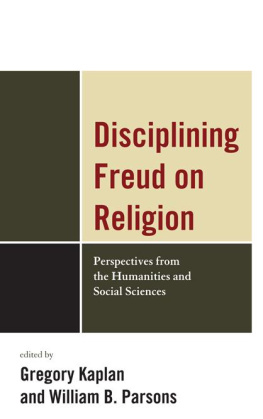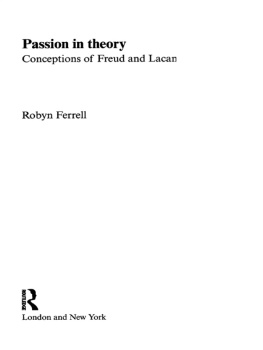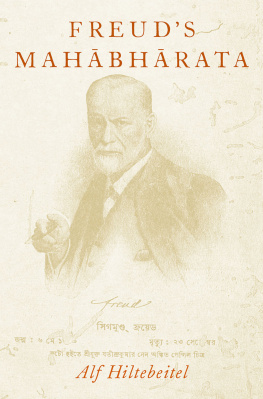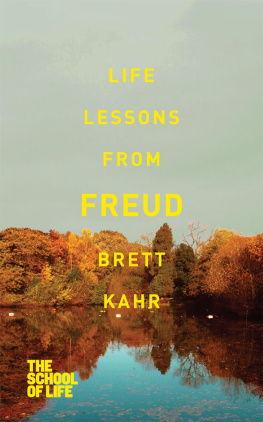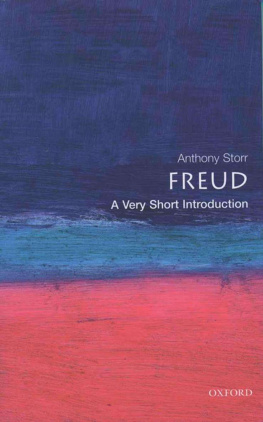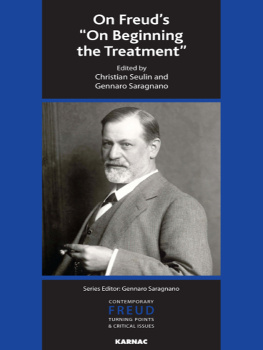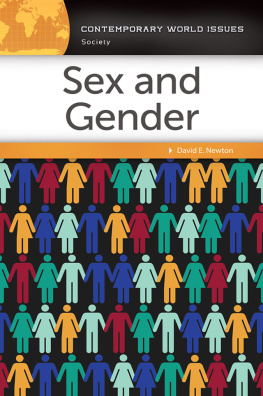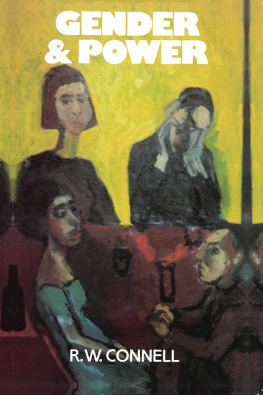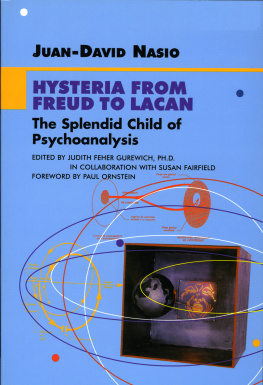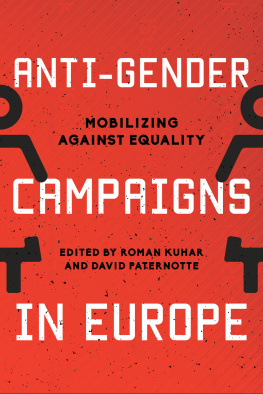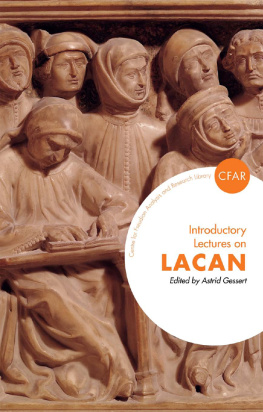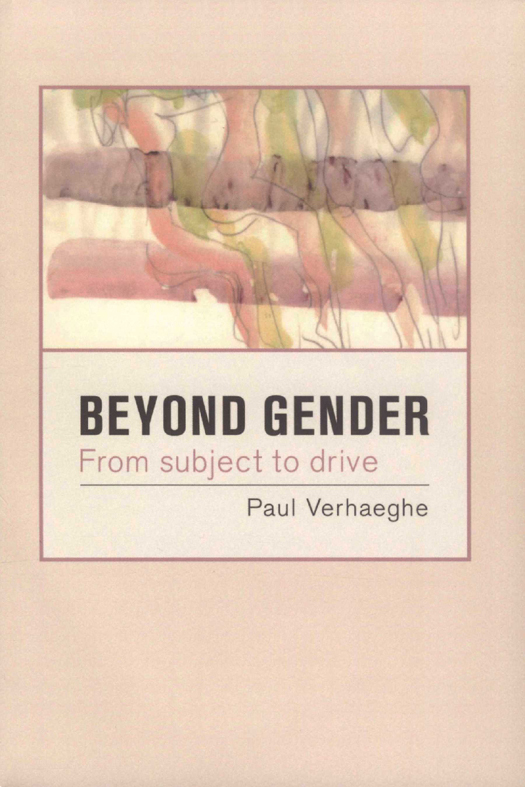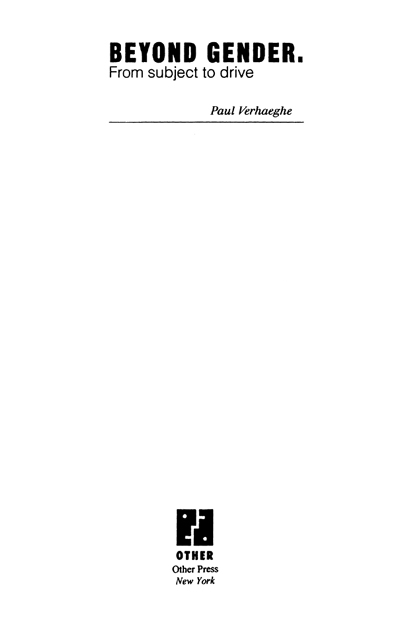Keywords:
1. Gender. 2. Drive. 3. Discourse Theory. 4. Lacan.

Copyright 2001 Paul Verhaeghe
cover painting Ignace Vandevivere
back cover photo Ron Zwagemaker
All rights reserved, including the right to reproduce this book, or parts thereof, in any form, without written permission from Other Press, LLC, except in the case of brief quotations in reviews for inclusion in a magazine, newspaper, or broadcast. For information write to Other Press, LLC, 307 Seventh Avenue, Suite 1807, New York, NY 10001. Or visit our website: www.otherpress.com.
Library of Congress Cataloging-in-Publication Data
Verhaeghe, Paul.
Beyond gender: from subject to drive / Paul Verhaeghe.
p. cm.
Includes bibliographical references.
eISBN: 978-1-59051-654-6
1. Psychoanalysis. 2. Freud, Sigmund, 1856 1939.
3. Lacan, Jacques, 1901. I. Title.
BF173.V445 2001
150.19;5dc21
2001053107
v3.1
CONTENTS
The Riddle of Castration Anxiety.
Lacan beyond Freud.
From Impossibility to Inability.
Lacans Theory of the Four Discourses.
Teaching and Psychoanalysis.
A Necessary Impossibility.
Trauma and Psychopathology in Freud and Lacan.
Structural versus Accidental Trauma.
Subject and Body.
Lacans Struggle with the Real.
Mind your Body.
Lacans Answer to a Classical Deadlock.
Dreams between Drive and Desire.
A Question of Representability.
Obsessional Neurosis.
The Quest for Isolation.
INTRODUCTION
Lacans work is notorious for its difficulty. Historically speaking, we are still so close to its development that a global understanding is, as yet, not possible. Lacan studies have started only recently. As a result, the present selection of my papers will necessarily contain a number of mistakes and be incomplete. Even so, it presents the reader with my own intellectual journey through Freud and Lacan. The central line of thought in these papers has everything to do with Freuds basic discovery, as re-examined by Lacan in his eleventh seminar, i.e. the discovery of the unconscious as a gap in the subject between what (s)he knows and the real driving forces of the psyche. In the last decades, much of psychoanalytic theory has been taken over by psychology, especially within gender studies and the study of the relationship between man and woman. It is my thesis that this relationship is nothing but a defensive elaboration of an underlying problem. And that is the point where the drive enters the scenethat is, at a point beyond gender as such.
This thesis is already present in the first paper, in which I interpret the idea of castration in a way different from the classic (post-)Freudian interpretation. In my reading, castration stands for a secondary elaboration of an original lack. The latter becomes only obvious through this elaboration, i.e. via the gender differentiation.
The theory of discourse demonstrates (among other things) how the subject wrestles with castration and the failure of the pleasure principle, in order to avoid and to mask the underlying problem, i.e. the jouissance. It is no coincidence that Freud (re)discovered this problem when he resumed the study of the trauma, nor that he coined it as something beyond the pleasure principle. The Lacanian discourse theory as such is elaborated in the second paper. At the time of its original publication, I was myself promoted to the position of the other-who-is-supposed-to-know, both academically and psychoanalytically. The effects of this position are considerable, and I tried to get rid of them in the third paper, Teaching and Psychoanalysis.
The concept of jouissance obliged me to return to the relationship between trauma and hysterical subject. The resulting thesis is that every subject starts with a structurally caused trauma, and that the way in which this trauma becomes elaborated through the relationship with the Other, determines our identity. In the meantime it became more and more obvious to me that the starting-pointcoined as the structural traumahad to be looked for in the drive and the body. Such a point of view evokes the classic idea of the binary relationship between soma and psyche, but the result of my study proved to be radically different. Indeed, the organism is not equivalent to the body of the medical discourse, which is always a symbolic body, organised by the signifiers that summarize the actual knowledge of medical science. Beyond that, we meet with the real body, although meet is not the most apt way of describing this confrontation. My attempt to understand this most difficult part of Lacans theory is to be found in two papers, Subject and body and Mind your body.
All these papers are based on a continuous joint reading of Freud and Lacan. As a consequence, my colleaguesparticularly my American ones, but also those in Europewill be confronted with a different Freud and Lacan than the ones they are used to. The ultimate touchstone remains the clinical practice, and that is the reason why this selection ends with two clinical papers.
Paul Verhaeghe
Laarne, summer 2001
THE RIDDLE OF CASTRATION ANXIETY.
Lacan beyond Freud.

Mind the gap. Mind the gap. Mind the gap
(Continuous warning, courtesy of the London subway)
One of the most obvious observations that can be made about castration anxiety is that it is very difficult to observe. Indeed, in clinical practice it is very hard to find a subject that comes to us complaining about his or her castration anxiety. To my knowledge, the ultimate castratophobia does not exist.
This clinical fact is endorsed by a historical one: the concept of castration anxiety itself only received its general expression at a rather late stage of Freuds theory. For example, as late as 1914, Freud equates the castration complex with masculine protest and states explicitly that there are neuroses in which this element does not appear at all.
No wonder that in the postfreudian period, the idea tended either to disappear or to become plainly ridiculous. An example of its disappearance can be found in the work of Kernberg, in which the ideas of Oedipus and castration are virtually lacking. An example of caricature can be found in a paper by Bell for whom, obviously, the bell has told, as she states explicitly that castration does not concern the penis but the balls, and that male anxiety has to be reconsidered accordingly.
Companied to this postfreudian absence, in Lacans work the concept is omnipresent, and, in contrast to Freuds naturalism, it is a very abstract concept. Indeed, the all-too-concrete penis is replaced by the phallus, of which we even have an imaginary and a symbolic version, each of these denoted by highly suggestive Greek characters. With the postlacanians, the concept becomes ever more abstract, even to the point where it becomes confused with the idea of a constitutional or existential lack, synonymous with


